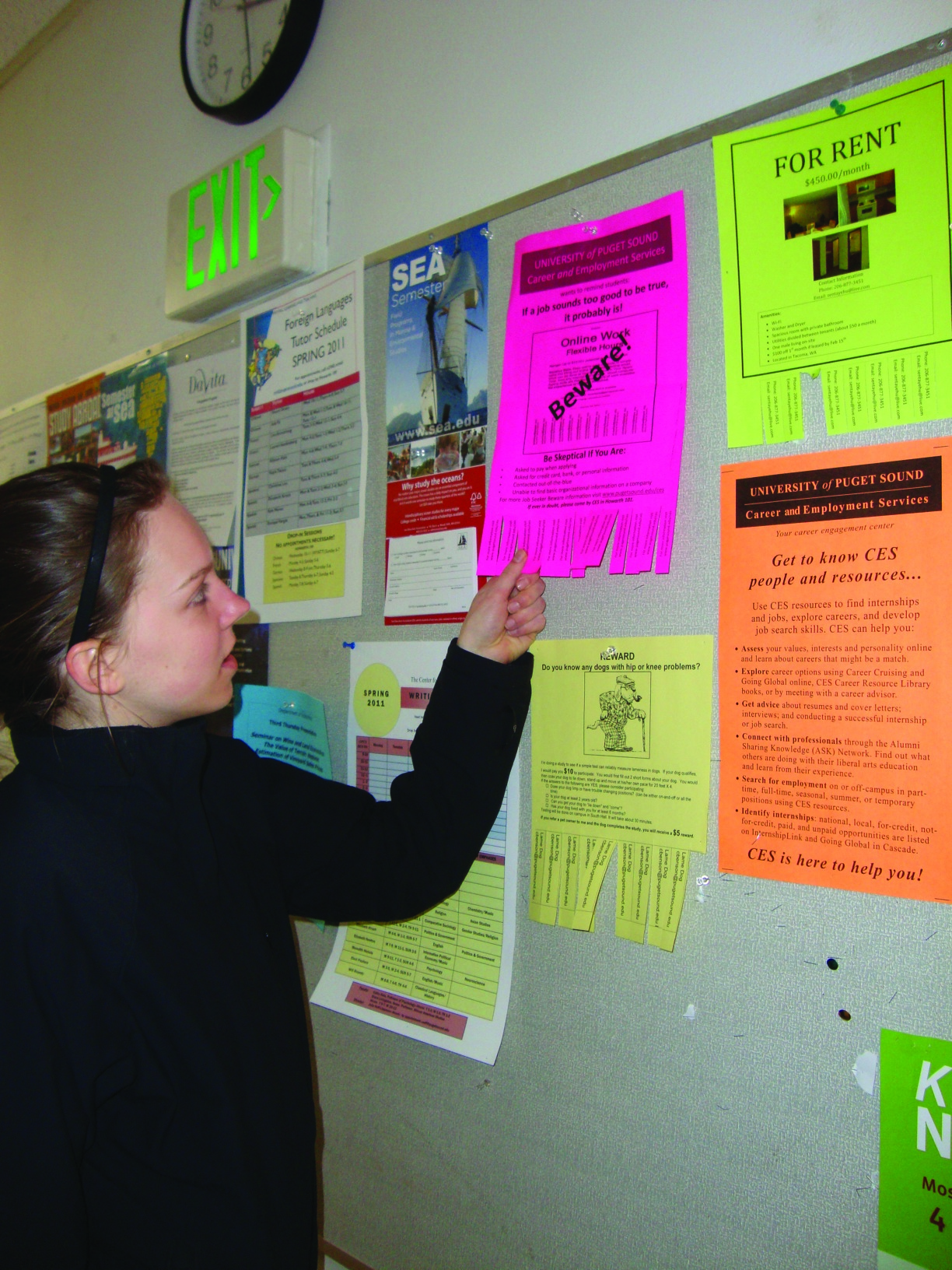
The other day I was sitting in class and had a disconcerting experience. You know those bright pink CES posters that encourage us to “Beware” of scam flyers? Well, I found one of the actual scam flyers and took it down off the wall, and by the next class period another was right back up in its place.
The flyer reads, “Online Work, Flexible Hours. Range: Up to $12.00+ potential per hour to start” and has tear-off strips that say, “Easy Work, No Exp. Req… www.work125.com.” According to CES, it is not to be trusted.
To get to the root of the problem and try to understand what we can do to protect ourselves as students against fraudulent employment opportunities, I went directly to Alana Hentges, Associate Director of CES.
Regarding Work125.com, CES was never able to get enough information about the organization to be able to really say they trust it.
“At CES we’re about giving students the opportunity to be mindful in terms of their employment. If students have all the information, then they can make the best decision,” Hentges said.
What it really comes down to, especially for students who are, at least for the most part, new to the job market, is being savvy of the opportunities presented to them, she said.
One thing that helps students to be savvy is knowing the warning signs to look for when seeking employment.
“Employers shouldn’t have to intrigue students into signing up for a job, they should have a genuinely good opportunity,” Hentges said. “So if they don’t provide an email address, that should be a flag.”
If the employer has a generic email address from web sites such as Gmail or Yahoo, or if they request the names of your friends, those should be indicators of fraud as well.
“Vagueness in a job description is certainly a flag,” Hentges said as she showed me the web site. “Online work, no experience required, no degree… Our motto is ‘if it sounds too good to be true, it probably is.’”
In fact, on CES’ Recruiting Policies web page it says, “Employers are required to fully disclose organization information when recruiting Puget Sound students for any position. This includes but is not limited to: name of organization; type of organization; description of organization; available position title(s) and description; method of remuneration; and contact information.”
Sometimes CES will even perform a Google Maps search on an address provided to see if the business has an actual office.
Interestingly, this semester is not the first time that flyers like this have been posted on our campus. Last semester, for instance, the exact same flyers were posted, but with a different web address.
When Hentges and I looked at GetResponse.com—the web site from the first flyers—and read their job description, it was clear that it was very generic and was intended to draw applicants in with vagueness and mystery instead of detail.
“Qualified applicants should have a desire to develop their current skills and excel within the organization. They will have the necessary characteristics to assist customers in achieving their short and long term goals,” the web site said.
For Hentges and the rest of the CES staff, it was clear that these so-called job opportunities should not be trusted.
“These web sites are highly questionable and it is highly likely that it is a scam,” she said. “There is nothing about these opportunities that is clear, that shows it is a good job for students.”
Web sites and organizations like these prey especially on college students.
“Students are susceptible because the media has perpetuated the really bad economy. But Puget Sound students have been really smart about it,” Hentges said.
For this reason, CES has a specific list of tips and warnings for students in the job market that can be found on their university webpage under the heading “Job Seeker Beware.”
Hentges herself also mentioned that companies approved to post flyers around campus would have their flyers stamped saying that they are CES approved.
“At CES we want the students to be learning and growing from the opportunities,” Hentges said. “We don’t just want the employer to benefit from our students’ talents. I know that our students can succeed, and I hope they don’t fall prey.”
For more information about job opportunities and tips on protecting yourself from scams and fraudulent opportunities, visit CES during its drop-in advising hours every Monday through Friday from 2 p.m. to 4 p.m. You can also find CES online at http://www.pugetsound.edu/about/offices–services/ces/.
You can also visit The National Association of Colleges and Employers (NACE) website, http://www.naceweb.org/principles/, as well as the Better Business Bureau, http://www.bbb.org.
[PHOTO COURTESY / TEDDI TOSTANOSKI]



